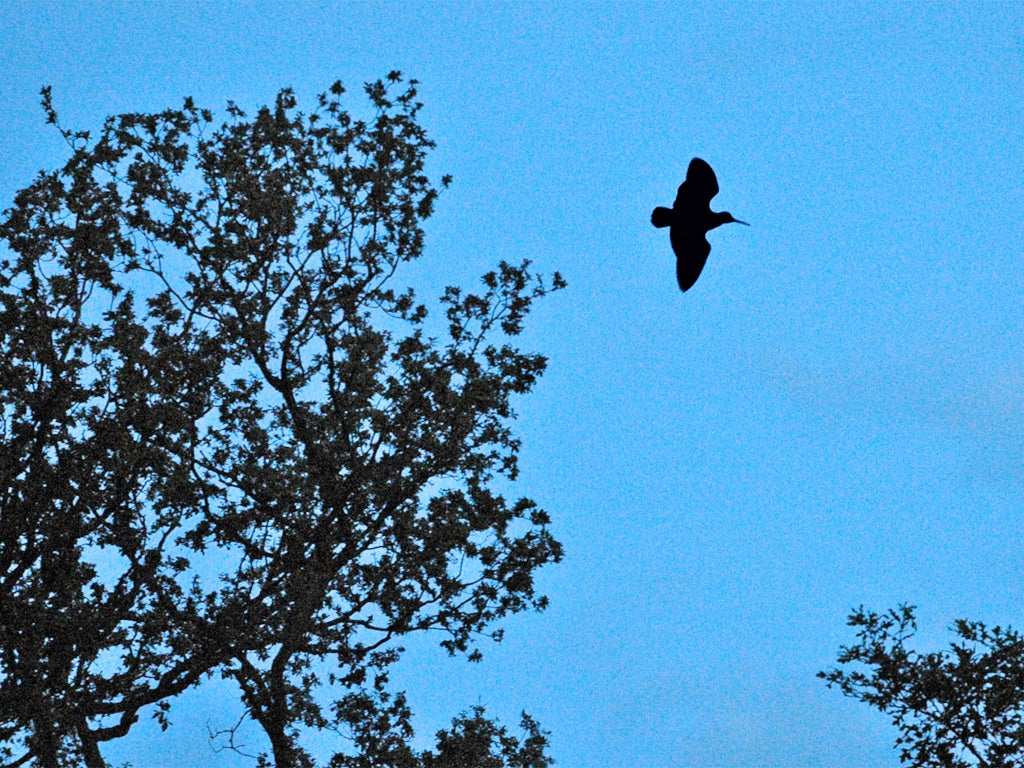Nature Studies by Michael McCarthy: The shy woodcock, our most mysterious bird

Setting eyes on a mystery is always memorable, perhaps even more so at dusk, in the atmospheric borderland between day and night; most of all in the long dusk of early summer. And on Friday evening of last week, which was 1 June, the first day of summer in some calendars, I found myself deep in a Hampshire woodland as the light faded and the owls began to call, waiting for the mystery to appear.
When it came, it was preceded by a curious noise, which some say is like the croak of a frog but to me was more like the grunt of a small pig: urg, urg, urg. The sound emerged from the air, and we looked up and watched as it came into view in silhouette against the darkening sky, a plump barrel-chested bird with a long bill and a fluttering, shallow-winged flight almost like a bat's, except it was not swooping around but heading in a dead straight line, 50 feet above us, grunting as it flew. A flying piglet.
I was thrilled, as this was the most mysterious bird in Britain: the woodcock. It was performing its display flight to attract females, which is known as "roding", and which is really the only chance you have of setting eyes on it. A friend who is a celebrated birder, undoubtedly one of the best in the country, said to me once: "Know anybody who's had a good look at a woodcock?" And few people have.
For the woodcock takes secrecy to lengths unmatched by other bird species. It's a living contradiction, a wader – that is, a bird of the seashore – which has abandoned the water's edge to live in the woodland, and evolution has doubly equipped it for survival there. It possesses an intense reclusive shyness, rarely leaving the undergrowth, and a quite astonishing camouflage, a mottling of browns and russets and buffs which can render it invisible on a woodland floor, even if you're on top of it.
Thus, not only are Britain's resident breeding woodcock invisible (the last survey suggested there are about 78,000 male birds), but so are the many more which migrate to spend the winter here from the colder parts of Eastern Europe, a vast influx of an estimated 750,000 individuals, most of which arrive together in the first week of November.
Imagine. Three quarters of a million fat, chicken-sized creatures plop into Britain all in one go, and promptly disappear. The best glimpses I've ever managed have been of odd birds shooting away like cannonballs when I've disturbed them.
But the springtime and early-summer, roding, when the resident males patrol a circuit at dawn and dusk above their wood, grunting to make the females show themselves, is the one chance of a lingering look, and I was fortunate last week in going to see it with Dr Andrew Hoodless of the Game and Wildlife Conservation Trust, who is Britain's leading woodcock expert.
Andrew has spent more than 20 years elucidating the mystery that is Scolopax rusticola, and has made some remarkable discoveries, from the fact that their gruntings can be individually identified, to the migration routes of the winter-visiting birds.
One which he fitted with a satellite transmitter in Cornwall last February is now on its breeding territory north of Krasnoyarsk in Central Russia, more than 3,600 miles away (you can follow its route and that of other satellite-tagged birds at www.woodcockwatch.com).
I found it surprising that Andrew, for all his experience, was still as animated as I was by the appearance of the roding male and the dozen or so grunting passes he made above us. But he said: "They're such fascinating birds, I don't think I could ever tire of them."
And I agreed. I never thought a flying piglet could be so exciting. But then a touch of mystery transforms everything.
Join our commenting forum
Join thought-provoking conversations, follow other Independent readers and see their replies
Comments
Bookmark popover
Removed from bookmarks